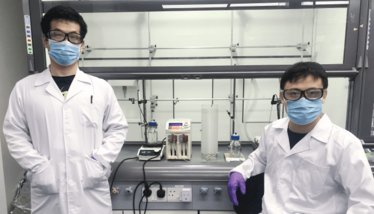Synthesizing Synthesis
Solid-phase synthesis: an auto-magic medicine for the ills of continuous-flow processing?

Batch manufacturing is a far-from-perfect process and Associate Professor Wu Jie of the Department of Chemistry at the National University of Singapore knows it. Proving the power of continuous synthesis, he and his team have automated the production of pharmaceutical compounds, beginning with a demonstration of the production of prexersatib, a molecule used in cancer treatment. Their fix lies in merging solid-phase synthesis (SPS) and flow operation.
“In batch manufacturing, intermediates need to be isolated and purified before subsequent processing,” he says. “This is inevitably accompanied by loss of products, waste generation, as well as cumbersome manual work.” But SPS, he explains, allows for increased flexibility. It condenses several synthetic steps into a single uninterrupted process, avoids the purification and isolation of intermediates, and benefits from a range of processing advantages including mass/heat transfer, better reproducibility, and enhanced safety.
Wu says, “By applying the SPS-flow system into the auto-assembly of drug molecules, the target molecule grows on a solid support while all reagents and catalysts stay in the mobile phase. At the last step, the product is detached from the resin, followed by a single purification to afford the pure product. This strategy avoids the problem of reagent/solvent/byproduct incompatibility between synthetic steps and enables automation with longer synthetic steps and a much wider range of reaction conditions and reaction types.”
But continuous flow isn’t perfect either. Wu says that “fully end-to-end continuous-flow syntheses rarely exceed two steps before offline purification. To realize a fully multistep continuous-flow synthesis is challenging, mainly due to issues originating from solvent and reagent incompatibility, the accumulation of side-products, risk of clogging, and mismatch of time scales between steps in a consecutive processing chain.”
Wu and his team remain optimistic. They are well aware that automated SPS-flow synthesis could have the potential to produce many important pharmaceutical molecules and have already begun tests aiming to scale up their platform.
Between studying for my English undergrad and Publishing master's degrees I was out in Shanghai, teaching, learning, and getting extremely lost. Now I'm expanding my mind down a rather different rabbit hole: the pharmaceutical industry. Outside of this job I read mountains of fiction and philosophy, and I must say, it's very hard to tell who's sharper: the literati, or the medicine makers.



















